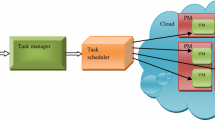Abstract
In view of the problem of inaccurate scheduling by using traditional resource scheduling method, because the method is mainly based on extracting and classifying the resource features to make scheduling, ignoring the effect of the feature relevance between the resources on the scheduling results. This paper presents a model for multimedia cloud resource scheduling based on multi- device constraint. In this method the objective function is no longer constrained only by the CPU computing capacity and the minimized completion time, but to achieve a minimum time-consuming of CPU, memory and other peripherals operation are considered as the scheduling objectives. Then the utilization of solving constrained jointly is employed to obtain the mapping relationship of the optimal virtual and physical machine. Moreover, a regressive dimensionality reduction algorithm is designed for this scheduling model to solve the high dimensional problems aroused by multi-device constraints. Simulation results show that the improved algorithm has a better performance than the traditional algorithm, has a good efficiency and has a certain convergence.








Similar content being viewed by others
References
Ahn H, Min J, Yoo D, Kim H, Kim Y (2014) Data analysis of fish species change depending on existence of wetland at Lake Paro upstream for the wireless monitoring of ecosystem [J]. J Converg 3(5):17–21
Beloglazov A, Abawajy J, Buyya R (2011) Energy-aware resource allocation heuristics for efficient management of data centers for cloud computing [J]. Futur Gener Comput Syst 5:94–97
Fang Y, Wang F, Ge J (2010) A task scheduling algorithm based on load balancing in cloud computing. Web Inf Syst Min 8(12):59–63
Guangbo HU, Hong LIANG, Qian XU (2011) Research on chaotic feature extraction of ship radiated noise. Comput Simul 28(2):22–24
Guéguen C, Baey S (2012) Comparison study of resource allocation strategies for OFDM multimedia networks. J Electr Comput Eng 10(11):466–471
Gupta GP, Misra M, Garg K (2015) An energy efficient distributed approach-based agent migration scheme for data aggregation in wireless sensor networks [J]. J Inf Process Syst 11(1):148–164
Kang H-S (2015) A real-time integrated hierarchical temporal memory network for the real-time continuous multi-interval prediction of data streams [J]. J Inf Process Syst 11(1):39–56
Li C, Li L (2013) Efficient resource allocation for optimizing objectives of cloud users, IaaS provider and SaaS provider in cloud environment [J]. J Supercomput 2:134–138
Liu S, Cheng X, Fu W et al (2014) Numeric characteristics of generalized M-set with its asymptote [J]. Appl Math Comput 243:767–774
Liu S, Fu W, He L et al (2015) Distribution of primary additional errors in fractal encoding method [J]. Multimed Tools Appl. doi:10.1007/s11042-014-2408-1
Liu S, Zhang Z, Qi L et al (2015) A fractal image encoding method based on statistical loss used in agricultural image compression [J]. Multimed Tools Appl. doi:10.1007/s11042-014-2446-8
Luo L, Zhen Z (2012) IPV6 based network security intrusion detection technology research [J]. Bull Sci Technol 28(4):113–115
Manvi SS, Shyam GK (2013) Resource management for infrastructure as a service (IaaS) in cloud computing: a survey [J]. J Netw Comput Appl 8(2):312–315
Motavaselalhagh F, Esfahani FS, Arabnia H (2015) Knowledge-based adaptable scheduler for SaaS providers in cloud computing [J]. Human-Centric Comput Inf Sci 5(16):1–19
Pan Y, Zhang J (2012) Parallel programming on cloud computing platforms - challenges and solutions [J]. J Converg 3(4):23–28
Park JH, Suk SK, Lee DG (2014) Log data integrity support scheme for reliable log analysis of OSP [J]. J Converg 4(5):1–5
Ren-Shang Z (2012) Network intrusion detection system based on expert system and neural network. Comput Simul 29(9):162–165
Silachan K, Tantatsanawong P (2014) Imputation of medical data using subspace condition order degree polynomials [J]. J Inf Process Syst 10(3):395–411
Sinha A, Lobiyal DK (2013) Performance evaluation of data aggregation for cluster-based wireless sensor network [J]. Human-Centric Comput Inf Sci 6(15):3–12
Valêncio C, Oyama F, Neto PS, Colombini A, Cansian A, de Souza R, Corrêa P (2012) MR-Radix: a multi-relational data mining algorithm [J]. Human-Centric Comput Inf Sci 2(4):1–17
Wang W-J, Chang Y-S, Lo W-T, Lee Y-K (2013) Adaptive scheduling for parallel tasks with QoS satisfaction for hybrid cloud environments [J]. J Supercomput 2:15–19
Wang W-J, Chang Y-S, Lo W-T, Lee Y-K (2013) Adaptive scheduling for parallel tasks with QoS satisfaction for hybrid cloud environments [J]. J Supercomput 2:28–32
Warneke D, Kao O (2011) Exploiting dynamic resource allocation for efficient parallel data processing in the cloud. IEEE Trans Parallel Distrib Syst 10(3):136–139
Wickboldt JA, Esteves RP, de Carvalho MB, Granville LZ (2014) Resource management in IaaS cloud platforms made flexible through programmability [J]. Comput Netw 5(1):125–128
Zhang L, Chen Y, Sun R et al (2008) A task scheduling algorithm based on PSO for grid computing. Int J Comput Intell Res 12(8):26–29
Acknowledgments
This work is supported by the Scientific Research Fund of Jiangxi Provincial Education Department of China (Grant No. GJJ13704). Funding Support By Key Laboratory Higher Education of Sichuan Province for Enterprise Informationalization and Internet of Things (No. 2014WYJ06); Sichuan Provincial Key Research Base of Intelligent Tourism (No. ZHZ14-02).
Author information
Authors and Affiliations
Corresponding author
Rights and permissions
About this article
Cite this article
Zhu, W., Jiang, H., Zhou, S. et al. An optimal resources scheduling strategy on multimedia cloud computing under multi- device constraint. Multimed Tools Appl 76, 19429–19444 (2017). https://doi.org/10.1007/s11042-015-3140-1
Received:
Revised:
Accepted:
Published:
Issue Date:
DOI: https://doi.org/10.1007/s11042-015-3140-1




